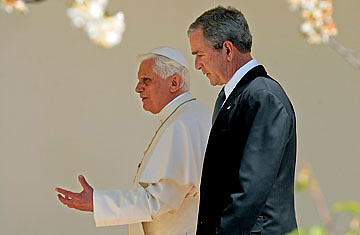
Pope Benedict XVI and U.S. President George W. Bush at the White House on April 16
George W. Bush likes to say he's sprinting to the finish, and this week he certainly looks like it. At the White House today he laid on a full welcome for Pope Benedict XVI, complete with concussive 21-gun salute, multiple fanfares and Kathleen Battle leading the crowd in "Happy Birthday" in honor of the Pontiff's 81st. Later in the day he made a speech on climate change. On Thursday he sees the British Prime Minister, Gordon Brown, and on Friday the South Korean Prime Minister arrives for a visit to Camp David. Bush then flies to New Orleans for meetings with the leaders of Canada and Mexico.
Bush played the head-of-state role to the hilt as he basked in the Pope's aura Wednesday, telling the crowd of some 13,500 on the South Lawn that he and Laura were privileged to welcome him to the White House and that the world needed his messages of morality and freedom. The theatrics continued with a fife and drum band and a chorus singing "Battle Hymn of the Republic." But by the time Bush held a dinner in Benedict's honor Wednesday night, with the Pope not attending (the Pontiff does not attend dinners given in his honor), it started to look as if Bush was laying it on a bit thick.
And, in fact, diplomatically speaking, things don't look so prosperous beneath the surface. When House Speaker Nancy Pelosi killed Bush's Colombia Free Trade deal on Capitol Hill Monday, she added to a growing list of dead and dying diplomatic initiatives the Administration had hoped would revivify his presidency in its fading months. Talks on Israeli-Palestinian peace, North Korean nuclear weapons and missile defense cooperation with Russia are all foundering, threatening chances for a White House signing ceremony that could soften a legacy dominated by the hard facts of the war in Iraq.
It didn't always look so bleak. Last November Bush brought Arabs and Israelis together in Annapolis, Md., to launch a final-year push for peace. Though there were skeptics, Bush was proposing something none of his predecessors had tried: a "paper only" deal that would be signed even with minimal on-the-ground concessions. Israeli Prime Minister Ehud Olmert and Palestinian leader Mahmoud Abbas were so politically weak, Bush negotiators thought, such a deal might be the only way they each could hold on to power.
Good idea: but then Hamas blew up the border wall between Gaza and Egypt, making themselves, not Abbas or Israel, real liberators in the eyes of many Arabs and Palestinians, and making a paper-only deal seem like just that. Though Secretary of State Condoleezza Rice continues to work the issue ahead of Bush's trip to celebrate Israel's 60th anniversary in mid-May, even White House spokesperson Dana Perino admits, "We have a hell of a lot of work to do."
Now even odds-on favorites for diplomatic success are in trouble. Russian President Vladimir Putin had seemed to want a deal to bookend his presidency, which ends May 7, but the divide on missile defense proved unbridgeable at talks in Sochi this month. At home, Democrats emboldened by Bush's weak numbers and their own rising electoral prospects in November are loath to hand Bush a win even on trade deals with South Korea and Panama, which as recently as last fall had seemed more achievable than the Colombia deal.
Worst of all, a nuclear deal with North Korea that had seemed within reach is stalled and Administration attempts to jolt it back to life, says Bush's former Korea expert, Michael Green, are projecting to allies the "appearance of desperation" in pursuit of a signing ceremony. "That suspicion is there and the Administration is not sending signals to allies to reassure them that's not the case." Which is definitely not the diplomatic legacy Bush had in mind.
